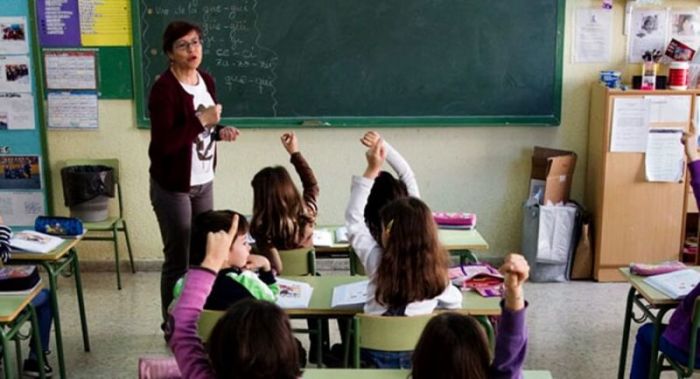Louisiana AG Releases New Guidance Telling Students They Can Pray Freely in School

Louisiana Attorney General Jeff Landry and U.S. Rep. Mike Johnson, R-La., have teamed up to produce a 15-page guide that seeks to alleviate the "confusion" about the religious freedom rights of students and teachers in public schools.
On Monday, the Republican politicians, both of which are lawyers, released the Louisiana Student Rights Review, a document that aims to provide guidance on prayer and religious expression in public schools.
The guidance decries the notion that public schools in the United States must be "religion-free zones."
"To the contrary, both federal and state laws specifically protect religious freedom rights in public schools," the document reads. "Thankfully, Congress and our state legislature still recognize the fundamental importance of religious liberty — the first freedom listed in the Constitution's Bill of Rights."
The guidance states that even though the U.S. Supreme Court has held that neither students nor teachers "shed their constitutional rights to freedom of speech or expression at the schoolhouse gate," there still seems to be much confusion about the First Amendment rights in public schools.
Although schools have to maintain a level of neutrality towards religion, that doesn't mean that students must be forced to withhold from engaging in their faith while on school grounds.
Courts have ruled that student speech is not the same as government-sponsored speech, the document explains.
The document assures that students are free to pray, read their Bible, discuss their faith and invite others to religious events during non-instructional time in school because all are a forms of speech protected by the U.S. Constitution.
The document stresses, though, that all religious activity must be student-led and student-initiated.
While there has been much debate in the last few years across the U.S. about pre-game prayers at high school football games, the review explains that students are permitted to lead and conduct team prayers at athletic contests or extracurricular activities.
The document also explains that students are legally allowed to advertise religious events and activities within the school on the same basis that other students can advertise secular events.
As some students across the nation have been told they can't pray in their graduation, another question the politicians answer is whether or not a student may pray during a graduation speech.
"That answer would depend on whether an objective person would see it as government endorsement of prayer in public schools. The U.S. Supreme Court has outlined a set of factors that would keep student prayer at such events from running afoul of the law," the document reads. "Such a prayer should be permissible if: (a) the school allows a time at graduation for a student to share a message of his or her own choosing; (b) neutral criteria determines which student is allowed to speak during this time; (c) there is no involvement or prior review of the speaker's message by the school officials or staff; and (d) students are instructed that their speech may not materially and substantially interfere with the graduation ceremony, or be vulgar, lewd or obscene."
The document also answers whether or not schools can legally recognize Christian holidays like Christmas and Easter. The document states that schools can refer to the holidays and even host Christmas or Easter parties that include festive music or school plays so long as the purpose is educational and not to "advance a particular religion."
The guidance also explains that students not only have the right to establish and receive school funding for religious clubs but also maintain the right to choose how the leaders of those clubs are selected.
A number of college student groups across the U.S. have been kicked off campus because of policies that require its student leaders to be practicing Christians who abide by a statement of faith.
"A religious club's freedom of association includes the right to choose its leaders based upon the club's chosen criteria," the document reads. "For example, a Christian club is within its right to require any leader to adhere to its statement of faith and beliefs. Also, because religious clubs must be student-led, schools must allow these choices to be decided by the club members."
The document also touches on the rights of teachers and employees, stating that teachers have the right to organize bible studies and prayer groups so long as they are not held during instructional time.
According to the document, teachers and faculty may only discuss religion with students if doing so is relevant to a classroom topic. The document also asserts that it is legal for teachers to incorporate Bible readings into their lessons when it is "presented objectively as part of a secular program of education."
The release of the Louisiana Student Rights Review comes after a Louisiana mother, with the assistance of the American Civil Liberties Union, sued the Webster Parish School District last month and alleged that the district was unconstitutionally promoting Christianity. The lawsuit listed 30 instances where Christianity was promoted in the school.
Commenting on Monday's guidance, ACLU staff attorney Bruce Hamilton told NOLA.com that the the guidance overlooks the "prohibition against establishment of religion."
"We see more of a problem with Louisiana schools imposing officials' religious views and beliefs on students rather than with Louisiana schools preventing students' exercise of religion," Hamilton argued.
"In other words, Louisiana schools are more likely to hinder religious freedom by imposing religious views on students, not by preventing students' religious practices," he continued. "Perhaps Mr. Landry would better serve the citizens of Louisiana by addressing that problem."




























